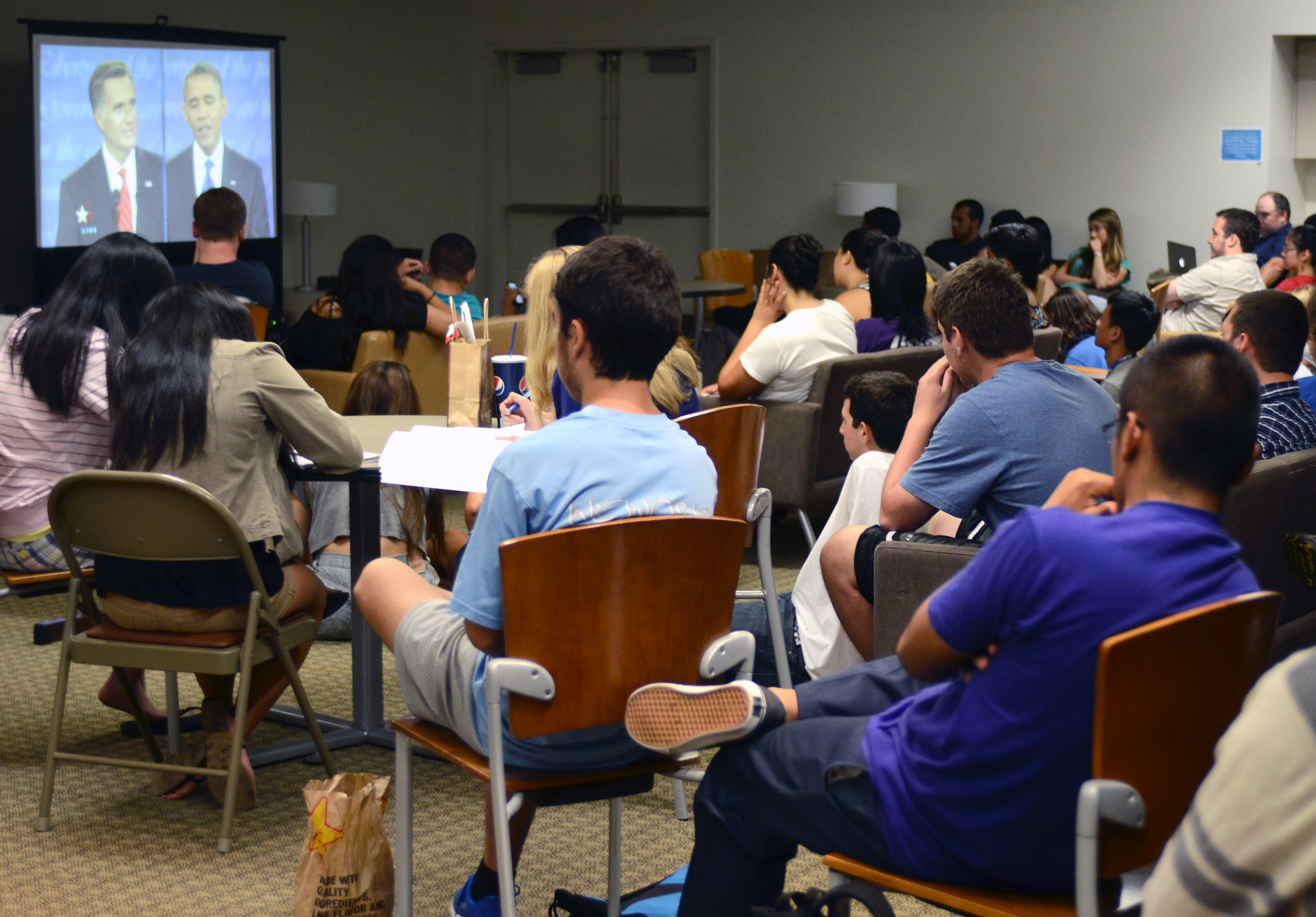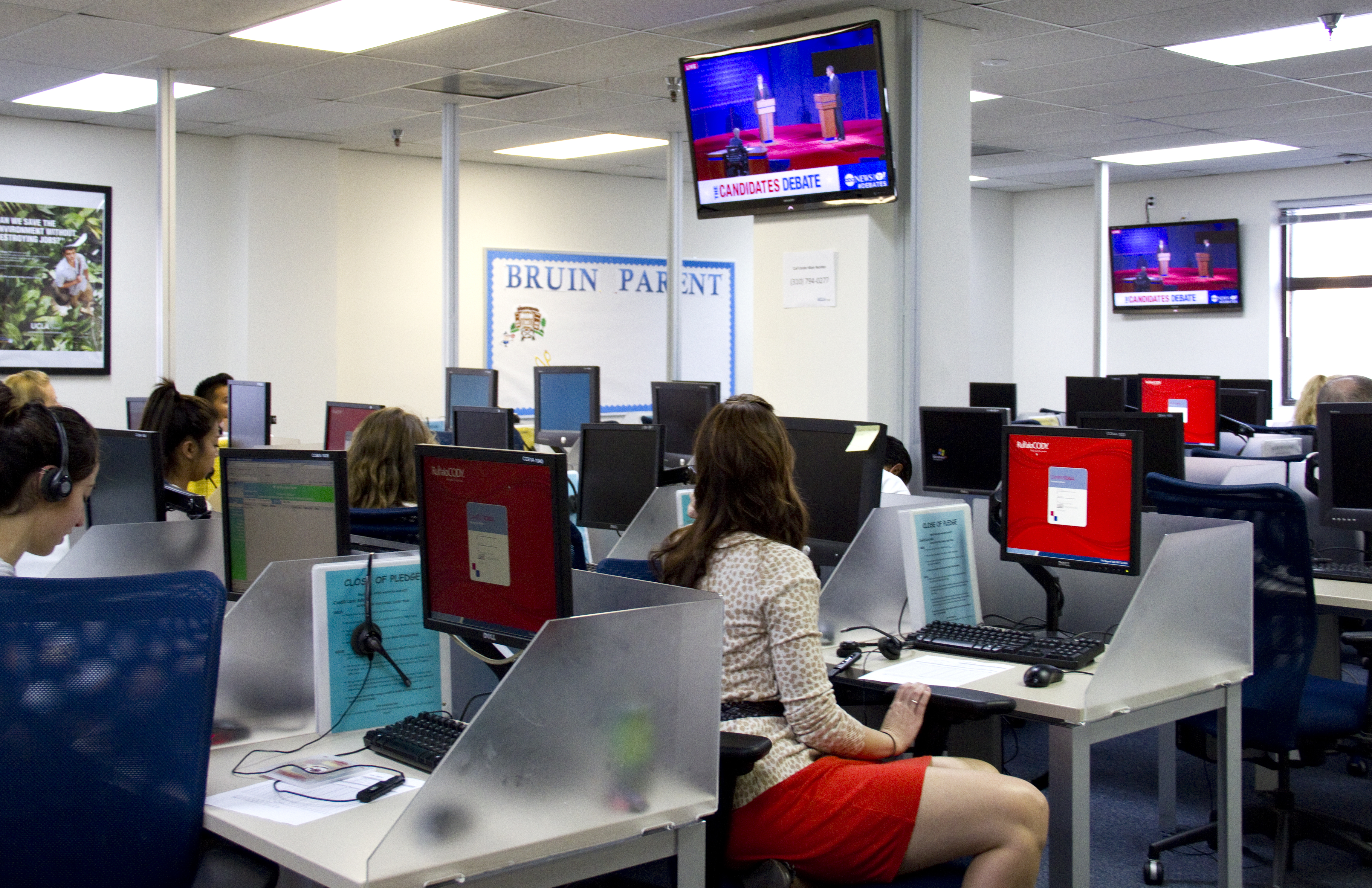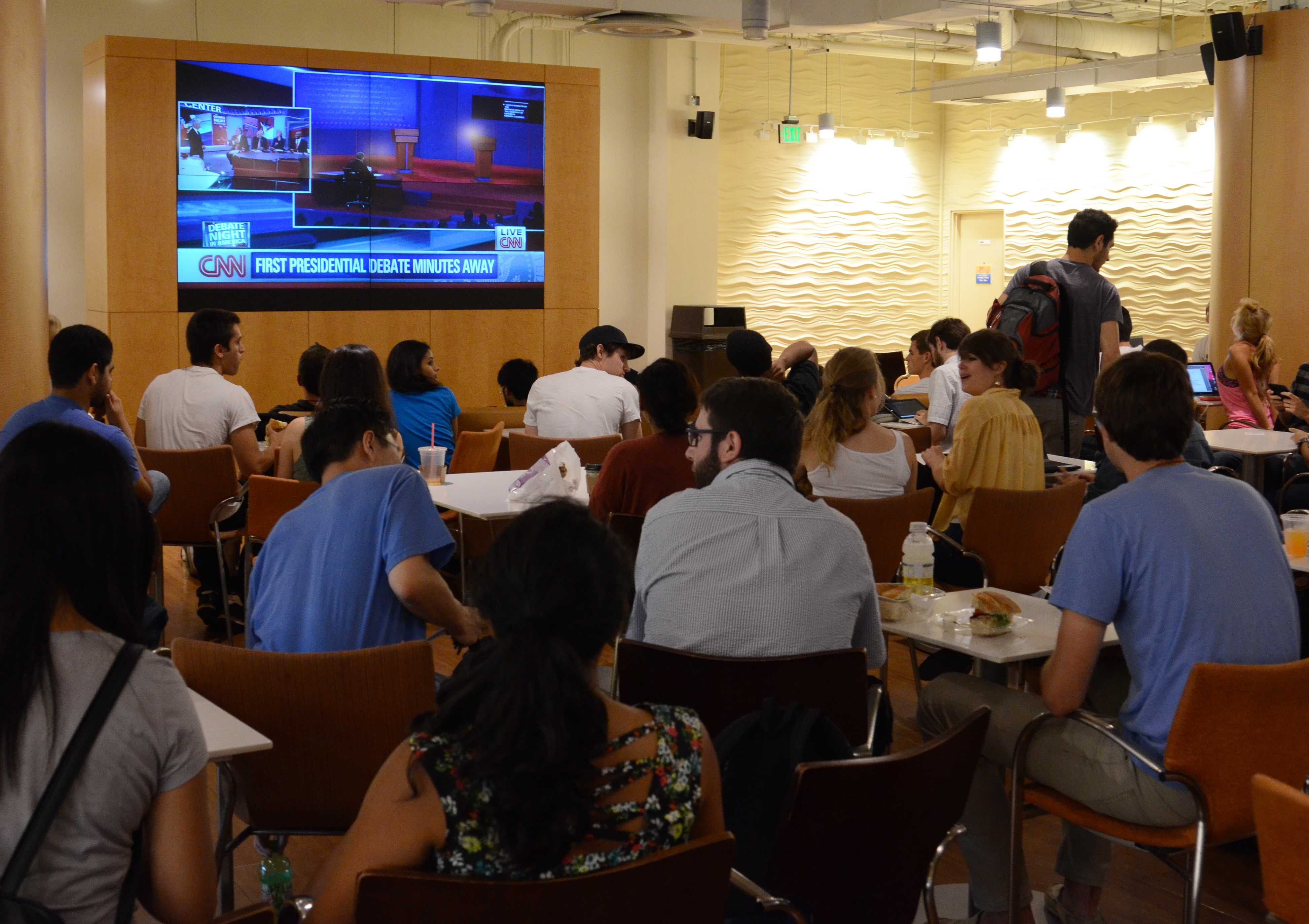
The Office of Residential Life hosted a presidential debate viewing party for students on the Hill on Wednesday in Rieber Fireside Lounge.

Student workers at the UCLA Call Center watch the presidential debate at their computer stations before their shifts Wednesday night.
Rows of students sat with their faces propped on their hands, brows furrowed in silent concentration, eyes all targeted toward a screen in the middle of Rieber Fireside Lounge.
Inside the UCLA Call Center on Gayley Avenue, about 30 students stared, fixated on three flat screen televisions, pausing only to grab handfuls of microwaveable popcorn as they sat at their computer stations before their work shifts. Groups of students ““ many who plan to vote in a presidential election for the first time ““ gathered across campus Wednesday night to watch Republican presidential hopeful Mitt Romney and President Barack Obama face off in the first presidential debate of the election season.
While many students clearly supported a particular candidate, some students went into the debate with open minds.
“When you’re watching a debate, a key component is to be open or there’s no point in watching,” said Cezanne Morton, a fourth-year anthropology student. To watch the debate, Morton arrived at the office an hour and a half before her shift at the call center, where she calls alumni to ask for donations to the UCLA Fund.
Before the debate, Matt Arnold, a third-year political science student who said he identifies as an independent voter, said he was looking to be convinced, while leaning slightly toward Obama.
“(Watching) stuff like this helps to keep in touch, especially because I’m a (political science student), when it’s hard to do so sometimes on campus with everything else going on,” Arnold said.
The debate was split into six 15-minute sections ““ all of which went over the time limit. The candidates discussed domestic policy topics including Medicare, the economy, the deficit and the Affordable Care Act, which has popularly been termed “Obamacare.”
The candidates started off by emphasizing their views on the economy and job creation.
“I don’t want to cost jobs,” Romney said. “My priority is jobs.”
The debate often became an exchange of criticisms, with Romney pointing out Obama’s shortfalls throughout the last four years, and Obama calling attention to Romney’s lack of specificity in his campaign proposals.
Obama cited his student loan reform in 2010 as one of his major accomplishments.
“What we’ve been able to do is to provide millions more students assistance,” Obama said. “And this is an example of where our priorities make a difference.”
During the debate, the candidates expressed views that differed as much as their contrasting ties, with Obama wearing a blue tie and Romney wearing red to represent their respective parties.
Contrast needed to be established in the debate, to set the candidates apart with the election less than a month away, said Tim Groeling, a communication studies professor and chair of the department, who specializes in political communications.
“(The debate) is one that could actually have some impact … I like how close the race is now,” he said.
After the debate, Groeling said he believes a better performance does not always correlate with the debate’s impact on the race.
“Research has shown that the post-debate analysis and commentary by the media can actually change voters’ initial impression of the debate winner, so sometimes winning the “˜spin’ after the debate can matter more than winning the debate itself,” he said.
The managers and supervisors at the UCLA Call Center shortened the 6 to 9 p.m. shift by an hour and a half, and gave student workers the option to watch the debate at the center before beginning their shift at 7:30 p.m.
Clay Puckett, a supervisor at the center, said the staff first decided to stop calls during the national conventions at the end of the summer after receiving complaints from alumni they called during the Republican National Convention.
The staff decided to live stream the debates for its workers and to continue to hold off on calling for donations during the debates, Puckett said.
William Chakar, a member of Bruin Republicans and a second-year physiological sciences student, said the debate is a way for students to solidify who they want to vote for.
Chakar said he thought Romney was the clear victor when the debate was over.
“Romney showed the nation tonight that he can stand on the national stage and present comprehensive solutions,” Chakar said.
After some deliberation, third-year biochemistry student Arshia Ashjaei said he thought Obama won, though he thought the debate was close.
“Clearly, Romney (won),” said Mark Petracca, a professor of political science at UC Irvine, in an email. “He beat expectations ““ (he) was energetic and enthusiastic. Obama sounded tired and stale.”
Debates have been of little consequence historically, Petracca said in his email, taking time from speaking to several major news organizations like National Public Radio.
“Chances are they will (likely) only serve to further confirm impressions of the candidates which voters already have of the candidates,” he said.
The next debate will be held Thursday, Oct. 11, between Vice President Joe Biden and Representative Paul Ryan (R-Wis.). Two more presidential debates will occur later this month.
Morton said she started watching the debate leaning toward Obama and still supported him after it was over, but doesn’t agree with his policies of federal government involvement in issues like Medicare. But she said Romney’s support of big corporations is less favorable to her.
With Romney and Obama giving their closing statements on the three propped-up flat screen TVs in the background, the student call center workers gradually started to turn on their computer monitors, slipping their headsets over their ears as they prepared to start their nightly shift asking UCLA alumni for donations.
Still, the debate and upcoming election remained on some of their minds.
“As a viewer and someone who is voting, the key is to think of what is best for our country ““ not just what is best for me,” Morton said, as she moved toward her computer station and started her shift.
The Daily Bruin’s mobile journalism blog, Mojo, asked a Bruin Republican and a Bruin Democrat for their reactions to the debate:
